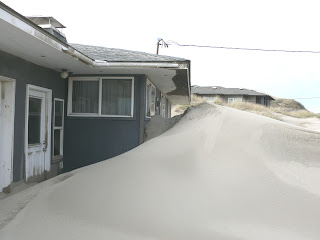I read in the paper that January winds of some 50 miles per hour─mild as winter winds go on the coast─at Waldport had buried houses on the sandspit on the north side of the Alsea river estuary where in the 80s and 90s speculators built houses on top of dunes and called them Bayshore Estates. Thursday, the 20th, a pleasant sunny day, we drove over to see for ourselves, parked the Audi on Oceania Drive, and walked.
The city had plowed the road to a nice level surface, but left owners to extract their own houses.
Some had already made progress─
we could see where sand had reached the attic windows─but many had not yet started.

We walked up to a few to get a closer look
and walked around to the ocean side which took the brunt of the wind.
Drifts reached the eaves of many of the one-story houses.
We found workers starting to extricate a few of the buildings.
The beach looked cleaner─more windswept─than we remembered from our hike last year when we photographed sea lions lounging in the sun.
Grass that stabilized the sand had been scoured down to nubs and dunes were almost free of tracks.
We talked with a couple also sightseeing and the man reminisced about his youth in Minnesota when he skied from his barn roof down snow drifts that looked just like these. (International Falls that week saw the temperature drop to minus 46 degrees Fahrenheit.) At Bayshore Estates, where sun won't melt drifts, owners pay $2,000 to $3,000 each year to remove sand. To give an idea of the problems they face, I copied a photo from the Waldport Chamber of Commerce website (http://www.waldport.org/).
In the photo, Bayshore Estates lies just beyond the bridge, the Pacific Ocean is just beyond the sandspit.
In the years we've been visiting the coast, we've watched developments grow up─the sandspit here, one at Siletz Bay, among others─and often wondered how bankers could fund such construction. Not only do they have the good Matthew's warning against building on sand, they have the example of Bayocean on Tillamook Spit, a development started a hundred years ago that at its height reached a population of some 2,000, the population of Waldport in 2009. In less than 50 years, the sand and sea had taken everything.
The housing bust of 2008 revealed how the banks had funded this project: they wrote the paper for financing and collected fees for doing it, then sold the mortgages to accumulators who bundled the paper and resold them to speculators; the bankers did not care that the houses were constructed on sand as they no longer had a financial interest. An additional irony is that buyers didn't care either: many purchasers were speculators. Most of the houses on Oceania Drive are vacation rentals; many are for sale in the half million dollar range. Bankers made money, contractors made money, realtors made money, even buyers made money. For $99 to $500, you can spend a night on Oceania Drive listening to the crash of waves a few feet down and a hundred yards away.
Don't plan on a storm surge or a Tsunami, however.
The city had plowed the road to a nice level surface, but left owners to extract their own houses.
Some had already made progress─
we could see where sand had reached the attic windows─but many had not yet started.

We walked up to a few to get a closer look
and walked around to the ocean side which took the brunt of the wind.
Drifts reached the eaves of many of the one-story houses.
We found workers starting to extricate a few of the buildings.
The beach looked cleaner─more windswept─than we remembered from our hike last year when we photographed sea lions lounging in the sun.
Grass that stabilized the sand had been scoured down to nubs and dunes were almost free of tracks.
We talked with a couple also sightseeing and the man reminisced about his youth in Minnesota when he skied from his barn roof down snow drifts that looked just like these. (International Falls that week saw the temperature drop to minus 46 degrees Fahrenheit.) At Bayshore Estates, where sun won't melt drifts, owners pay $2,000 to $3,000 each year to remove sand. To give an idea of the problems they face, I copied a photo from the Waldport Chamber of Commerce website (http://www.waldport.org/).
In the photo, Bayshore Estates lies just beyond the bridge, the Pacific Ocean is just beyond the sandspit.
In the years we've been visiting the coast, we've watched developments grow up─the sandspit here, one at Siletz Bay, among others─and often wondered how bankers could fund such construction. Not only do they have the good Matthew's warning against building on sand, they have the example of Bayocean on Tillamook Spit, a development started a hundred years ago that at its height reached a population of some 2,000, the population of Waldport in 2009. In less than 50 years, the sand and sea had taken everything.
The housing bust of 2008 revealed how the banks had funded this project: they wrote the paper for financing and collected fees for doing it, then sold the mortgages to accumulators who bundled the paper and resold them to speculators; the bankers did not care that the houses were constructed on sand as they no longer had a financial interest. An additional irony is that buyers didn't care either: many purchasers were speculators. Most of the houses on Oceania Drive are vacation rentals; many are for sale in the half million dollar range. Bankers made money, contractors made money, realtors made money, even buyers made money. For $99 to $500, you can spend a night on Oceania Drive listening to the crash of waves a few feet down and a hundred yards away.
Don't plan on a storm surge or a Tsunami, however.












No comments:
Post a Comment